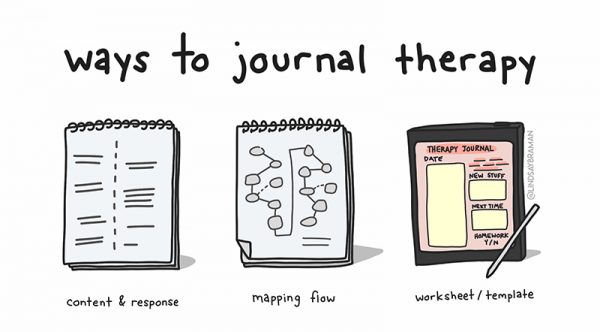If you are looking for a way to work through things on your own, journal therapy could be the answer. This is a form of self-help that allows you to explore your thoughts and feelings in depth without the need for an external person. All you need is a pen and paper or a word processor! Journaling has been shown to help with anxiety, depression, stress management, PTSD (post-traumatic stress disorder), and many other issues which can arise in our lives. It’s time to take control of your life again!
Contents
What Is Therapy Journal?

A therapy journal is a type of diary that allows you to record and reflect on your thoughts, feelings, and emotions. It can be based upon the principles of cognitive-behavioral therapy (CBT), psychoanalysis, or another form of depth psychology. This journal aims to help you understand yourself better so that you can make positive changes in your life.
The Difference Between Journal Therapy And Keeping A Journal
Therapy journals are usually more focused than regular journals. They often have specific exercises or prompts which encourage you to explore different areas of your life.
The main difference between journal therapy and keeping a journal is that the former is often used in conjunction with professional help, whereas the latter can be used completely on your own.
How Does Therapy Journal (Journal Therapy) Work?

Therapy journals work by allowing you to explore your thoughts and feelings in depth. This can be helpful for people who want to make positive changes in their life but find it difficult to talk about their emotions or experiences with others.
Journal Therapy Exercises And Prompts
When you begin a therapist journal, there are some things that you may wish to consider:
- What areas of your life do you need help with right now?
- Which parts of your life are causing you the most difficulty?
- What is it that you want to change to create a better future for yourself?
Write down all of your thoughts and feelings, even if they seem negative or don’t make sense. You may wish to write down positive affirmations or statements about yourself which you can read when needed for encouragement and motivation. It’s important not to censor what you write because writing things down helps us process them more easily.
Tips For Therapy Journal (Journal Therapy)

There are some things that you could consider to get the most benefit from your journal writing:
- Make sure to use a special notebook only for your therapy journal so that you can keep all of your thoughts and feelings in one place.
- Try to write in your journal every day, even if it’s only for a few minutes. This will help you to establish a routine and make the process more regular.
- Allow yourself enough time to explore your thoughts and feelings fully. If you find that your mind is going blank, don’t be afraid to write “I don’t know what to say” or draw a picture.
- Don’t censor yourself! Write down everything that comes into your head even if it doesn’t make sense at first. This can help with processing the thoughts and feelings which are causing you problems.
How To Motivate Yourself For Writing A Therapy Journal?
There are a few things that you can do to motivate yourself for writing your therapy journal:
- Think about why you want to start a therapy journal. What do you hope to achieve from it?
- Create some goals for yourself which relate to your journaling. For example, “I will write in my journal every day for 30 minutes” or “I will write in my journal for at least one hour every Saturday”.
Limitations Of Therapy Journals
Therapy journals are often regarded as being only beneficial to the user in that they help them process their thoughts and feelings. While this can certainly be helpful, there are some limitations that should be considered:
- Journaling doesn’t usually give us much insight into how other people regard our problems or issues. This can mean that our perspective on the situation is skewed.
- It’s easy to get stuck in a rut when writing journal entries and it may be difficult for us to challenge ourselves or break out of old patterns of thinking without help from another person.
Professionals View On Therapy Journal

Therapy journals are often seen as a helpful tool in the therapeutic process. They can provide insight into our thoughts and feelings which may not be otherwise available. However, they should not be used in place of traditional therapy sessions with a therapist.
Research And Studies Related To Therapy Journals
There have been many studies that have looked at the benefits of journal therapy. Unfortunately, there has been little research into how other people regard our journal entries or if they’ve helped them to understand us better.
- The main benefit which is often reported by those who have used a therapeutic journal is that it can encourage deeper self-understanding and insight which would not otherwise be possible.
Professional’s Remark
From my professional standpoint, I (Nivi From Therapy Mantra) believe that a therapy journal can be a very powerful tool when used in conjunction with other forms of therapy. It can help the client to explore their thoughts and feelings more deeply, which can then lead to positive changes in their life.
Conclusion
Therapy journals can be a great way to help us process our thoughts and feelings. Especially if we find it difficult to talk about them with others. They can be beneficial for people who want to make positive changes in their life. But find it difficult to do so on their own. However, it’s important to remember that journaling has its limitations and it’s best used as one part of a wider therapy approach.
If you are looking for affordable Online Counseling MantraCare can help: Book a trial therapy session


